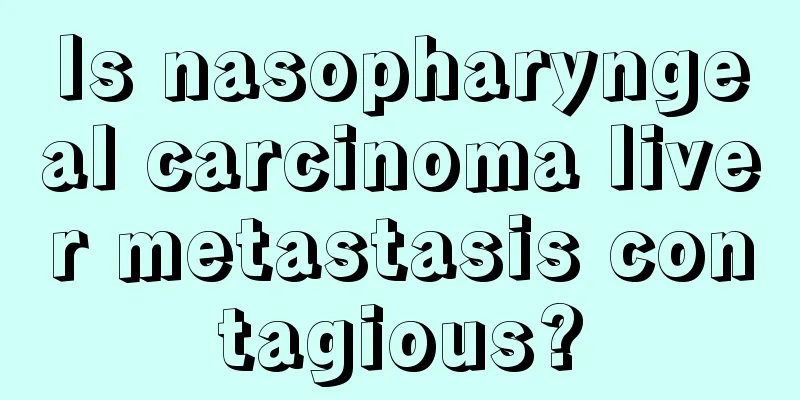Is nasopharyngeal carcinoma liver metastasis contagious?

|
Many people ask this question: Is liver metastasis of nasopharyngeal carcinoma contagious? This is a question that many patients ask doctors. In fact, nasopharyngeal carcinoma itself is not a source of infection and is not contagious. However, according to research, most patients with nasopharyngeal carcinoma carry a virus called Epstein-Barr virus, commonly known as the "kissing virus", which is an important killer that causes nasopharyngeal carcinoma. Nasopharyngeal carcinoma is not contagious like other germs. It is just that the presence of Epstein-Barr virus will aggravate the induction of nasopharyngeal carcinoma, which does not fundamentally mean that nasopharyngeal carcinoma is contagious. Therefore, liver metastasis of nasopharyngeal carcinoma is not contagious, but it must be treated in time. Radiotherapy plus Chinese medicine treatment for patients with liver metastasis of nasopharyngeal carcinoma is significantly better than radiotherapy alone in treating liver or lung metastasis after radiotherapy, with improved efficacy, longer average survival, and significantly reduced side effects, achieving better palliative treatment results. However, the average survival of patients with liver and lung metastasis was not significantly prolonged, indicating that systemic chemotherapy is needed to control metastasis to multiple organs. It is generally believed that distant metastasis is caused by hematogenous metastasis. Most scholars use systemic chemotherapy as the main method. However, since these patients are often in poor general condition and their liver and kidney functions cannot tolerate systemic chemotherapy, local radiotherapy combined with traditional Chinese medicine treatment is more important. It is certain that the control rate of local radiotherapy is significantly improved when liver and kidney functions are taken into consideration. Radiotherapy plus Chinese medicine treatment are combined with Chinese medicine treatment during radiotherapy and within 1 month after radiotherapy, with the main effects of invigorating the spleen and regulating qi, clearing away heat and detoxifying, promoting blood circulation and removing blood stasis, nourishing yin and raising white blood cells. The main medicines used are: Astragalus, Ligustrum lucidum, Lycium barbarum, Codonopsis pilosula, donkey-hide gelatin, Chuanxiong, Poria, Cuscuta australis, Angelica sinensis, Rehmannia glutinosa, peach kernel, Rehmannia glutinosa, safflower, ginseng, Ganoderma lucidum, Scutellaria baicalensis, Salvia miltiorrhiza and Panax notoginseng, decocted in water and taken orally, 1 dose per day. The idea of combining Chinese and Western medicine for treatment is to complement each other's strengths and avoid weaknesses, thus achieving a complementary advantage and often achieving a more ideal treatment effect. The above is an introduction to whether nasopharyngeal carcinoma liver metastasis is contagious, and of course, there is also an introduction to how to treat it. I hope these can help everyone to actively cooperate with the treatment and get rid of the disease as soon as possible. |
<<: Can nasopharyngeal cancer be contagious to humans?
>>: Is nasopharyngeal carcinoma mucus contagious?
Recommend
How to deal with throat blisters?
Throat blistering is a common symptom, which refl...
How to calculate normal weight?
In today's society, thinness is considered be...
To inhibit the occurrence of bladder cancer, prevention work is essential
Bladder cancer is a common disease in life. If yo...
What to do if blisters appear in the mouth
When we get inflamed or do not take in enough vit...
What to do if the surgical incision is infected
After the operation, there will usually be some w...
Men are at high risk of pancreatic cancer
Pancreatic cancer is a highly malignant tumor. Si...
What is the reason for frequent diarrhea
Many people have diarrhea. Most people have diarr...
How to remove tea stains from a purple clay teapot
In daily life, many people like to drink some tea...
How to repair scars after thyroid surgery?
There are many types of thyroid diseases, and the...
Is cervical fracture serious?
The cervical spine is a very important part of th...
What's the matter with coughing up blood
Coughing is a common condition, and there are man...
Sweating profusely at night due to a cold
When people have a cold, they will feel uncomfort...
How to do abdominal breathing correctly
The health of breathing is directly related to wh...
Preparation before chemotherapy for prostate cancer
Chemotherapy is one of the treatment methods that...
Four-step first aid for heat stroke
As the temperature gradually rises, the number of...









